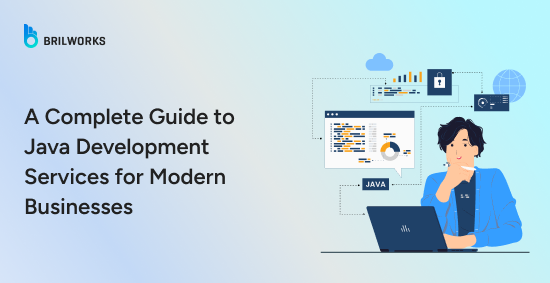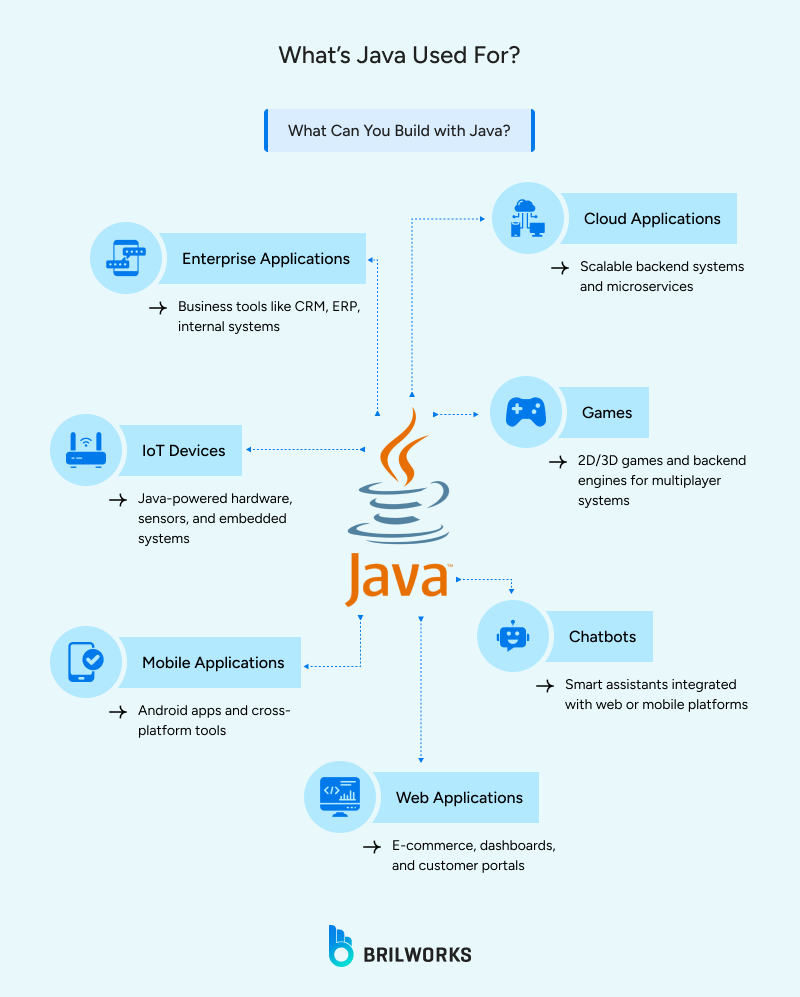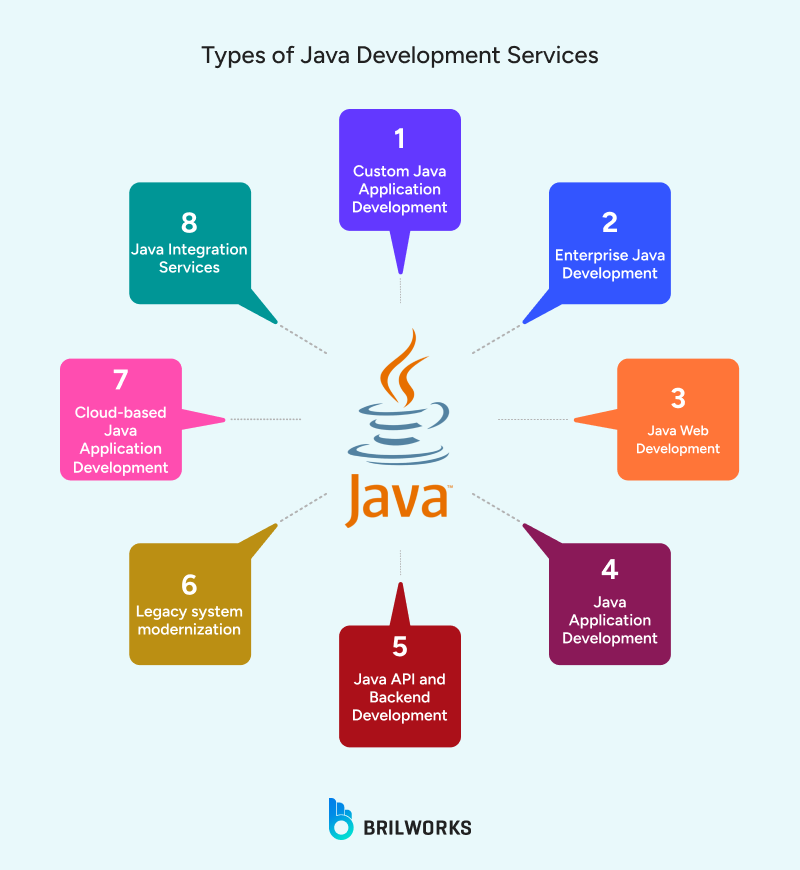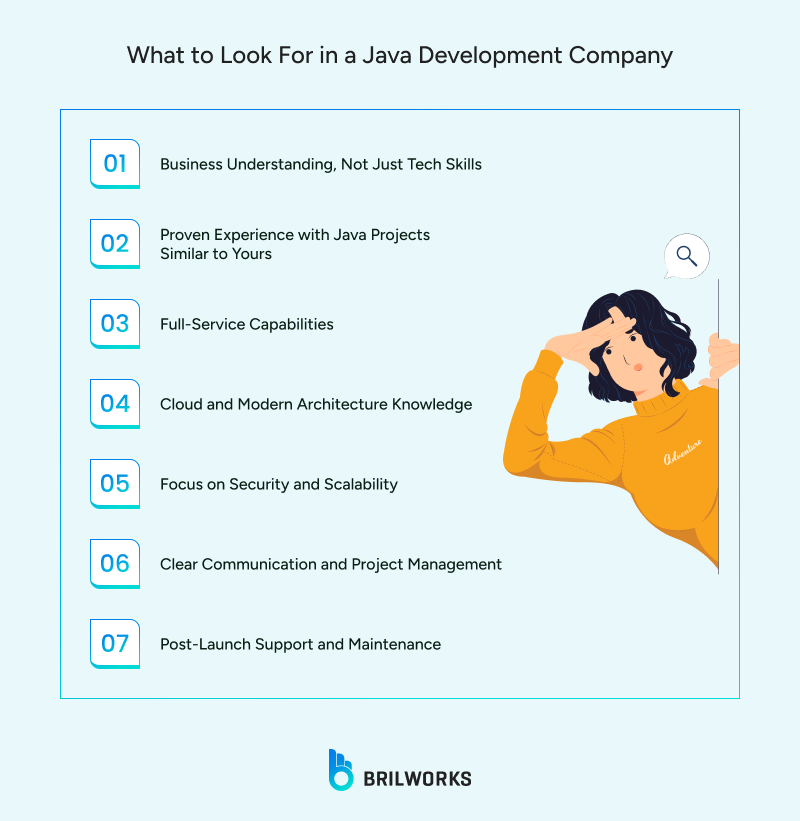COOPERATION MODEL
ARTIFICIAL INTELLIGENCE
PRODUCT ENGINEERING
DevOps & Cloud
LOW-CODE/NO-CODE DEVELOPMENT
INDUSTRY
FRONTEND DEVELOPMENT
CLOUD DEVELOPMENT
MOBILE APP DEVELOPMENT
LOW CODE/ NO CODE DEVELOPMENT
EMERGING TECHNOLOGIES








Java was released 30 years ago in 1995, yet after three decades it still remains one of the most popular programming languages in the world. What makes it reliable is its versatility of behavior. For example, Java is open source, which means anyone can view the JDK's source code and create a customized build. Another major advantage is that it is easy to learn because of its simple syntax and user friendly language.
Java is an optimal and dependable language that many enterprises use for either applications or backend. So, if you are one of the people who are thinking about hiring Java developers for their project, this article is for you. In this article, we are breaking down the types of Java development services and what those services can do for your business. Not only that, we are also covering which technologies are associated with services and briefly talk about how you can choose the right Java development company.

Java is an extremely versatile language, and many companies rely on it for that particular reason. It can power a variety of applications and programs that operate on different systems and devices, like mobile phones, IoT devices, and computers.
Here are some of the most common use cases for Java across industries:
Java is a dependable programming language suited for enterprise app development. Java is renowned for its long-term stability and capability of handling high volumes of users and transactions. Also, Java allows developers to run applications seamlessly across diverse operating systems and environments such as cloud and hybrid platforms. With cross-platform performance and robust security many industries like finance, healthcare, and government prefer Java for development.
Java is well-suited for the cloud applications because of its thread management and mature garbage collection. Another point that makes it a preferred choice is its scalability capability. Java has had decades to optimize performance in virtualized environments, which closely resemble how cloud containers and VMs operate. Its tight integration with container orchestration tools and compatibility with cloud-native frameworks like Spring Cloud gives it an edge for developing distributed systems.
Java is a strong fit for IoT devices because of its portability across hardware architectures. One of its greatest assets, the Java Virtual Machine (JVM), allows the same codebase to run on various embedded systems without recompilation, which is crucial in IoT's fragmented hardware landscape. Java ME (Micro Edition) and frameworks like Eclipse IoT are specifically designed for constrained devices, offering memory-efficient runtimes and secure communication protocols.
Moreover, Java's built-in security model, mature threading, and ability to handle asynchronous tasks make it reliable for real-time data processing and device coordination, which are core demands of IoT ecosystems.
Java is suitable for mobile application development because it's the foundational language for Android, which powers the majority of smartphones globally. Android's SDK is built around Java which gives developers native access to APIs, UI components, and hardware features. Moreover, Java's object-oriented structure promotes modular and maintainable code, ideal for evolving apps. Its vast ecosystem, tools like Android Studio, and strong community support also streamline development and debugging. In essence, Java is deeply integrated into the core of the world's largest mobile platform.
If you're planning to build a scalable and reliable application, Java remains one of the strongest choices out there. Whether you need a custom solution, enterprise platform, or backend system, the right expertise makes all the difference. Hire Java developer teams who understand your business goals and can turn them into robust, future-ready software.
It's clear that Java is an optimal choice for scalability and third party integration which also makes it a preferred choice for chatbots as well. Java integrates well with natural language processing libraries and third-party AI services as well. While not as lightweight as Python for prototyping, Java shines in production-grade chatbot systems that need to scale, connect with legacy systems, and run reliably within complex infrastructures.
Java is a preferred choice for web applications because it's stable, secure, and built to handle high traffic, which is exactly what businesses need when serving customers online. Big companies rely on it because it helps create websites and systems that rarely crash, are easy to update, and can grow as the business grows. It also connects well with other tools and services your business might already be using. In short, it’s a long-term, safe investment for building serious, reliable web platforms.
Java is good for games mainly because it’s cross-platform, meaning a game written once can run on many devices—PCs, mobile phones, and even the web—without rewriting the code. It handles graphics and user interactions well with libraries, which many developers use to build 2D and casual games quickly. While it’s not used for high-end console games, Java is a smart choice for mobile and browser-based games because it’s fast to develop, easy to maintain, and works smoothly across different systems, which saves time and money in the long run.
Java’s reach goes far beyond backend systems. It’s a language that supports everything from cloud platforms to mobile apps and IoT devices. That’s why many companies turn to Java application development services when they need solutions that are dependable and built to last.
Also read: Hiring Java Developers: What Model Fits Your Business Best

By now, you might have come to terms with which project you want to utilize Java for. So now we will discuss the main types of Java development services that can help you achieve your project success. Services vary a lot because there are multiple use cases related to Java as we discussed. Therefore, it becomes important what type of service you will choose for your development process.
Let’s dive right into the types of services:
Custom Java development is the process of building software solutions from scratch using the Java programming language. The process of custom development is designed specifically to meet your particular business goals. That means you can decide and choose each and every workflow according to your preference which is something you can't do in pre-built software.
Here's what you can build in custom development:
Web platforms (e.g., customer portals, internal dashboards)
Mobile apps (e.g., service apps, loyalty programs)
Enterprise tools (e.g., inventory systems, HR systems)
APIs or integrations with other services
Backend systems (e.g., booking engines, payment processing)
Let's say you run a chain of service centers. Standard booking platforms don't reflect your exact process or staff scheduling so you opt for a custom Java development to tackle this problem. A custom Java app could let customers book based on service type, technician availability, location, and past history. This works well for your internal team as well as they can see live updates and performance analytics.
Enterprise Java development means building large-scale, business-critical software systems using Java. These systems run important parts of a business like finance, HR, supply chain, customer management, or internal operations.
These aren't small apps. They are often complex platforms that involve multiple departments, large databases, user roles, security layers, and integration with other systems. Think of it as building the digital backbone of your business.
Why is Java preferred for enterprise development?
Because it is stable under heavy loads and secure enough for sensitive data. Also, it is very scalable and has proven its worth in industries like banking, insurance, healthcare, retail, and government.
See Also: The Complete Guide To Modernizing Legacy Healthcare Systems
Enterprise Java is behind systems like:
Bank transaction processing
Airline reservation systems
E-commerce backends
Hospital record systems
Supply chain management tools
CRM and ERP systems in large companies
If you have ever used a major company's internal platform or a secure government portal, chances are Java was powering it behind the scenes.
Spring Framework – the main toolkit for building scalable business apps
Java EE (now Jakarta EE) – a set of specifications for enterprise features like email, transactions, and web services
Databases – Oracle, MySQL, PostgreSQL, etc.
Security Layers – for authentication, encryption, and data protection
Cloud Hosting – deploying on AWS, Azure, or private servers
Let's say you own a chain of warehouses and stores. Instead of using disconnected software for inventory, logistics, HR, and sales, you get an enterprise Java system that tracks everything. This system tracks everything such as orders, stock levels, deliveries, and employee schedules across all your locations, in real time.
Java web development is the process of building websites or web-based applications using the Java programming language. These are not just regular marketing websites, they are often interactive, dynamic platforms where users can log in, make transactions, submit data, or access services.
Examples of web applications are:
Customer portals
Online booking systems
Payment gateways
E-commerce platforms
Business dashboards
Web-based internal tools for your team
The main role of Java is in the backend, the part users don't see, but which powers everything.
Java is a proven choice for building reliable platforms, especially when your web system is complex or critical to your business. Frameworks like Spring Boot speed up development, and strong community support makes it a safe, long-term option.
Let's say you run a logistics company and want a unified web platform. Two categories of people will access your website repeatedly. First, customers and second, your team. Customers need to log in, book deliveries, track shipments, and download invoices. At the same time, your team needs access to update delivery statuses, assign drivers, and generate reports. A Java-based web application is developed that handles all of this in one place. It ensures customers have a smooth experience while your team operates more efficiently, with secure access and real-time data.
With Java development you can create mobile apps, primarily for Android devices, since Android's operating system is built around Java. These apps run on smartphones and tablets, allowing your business to reach customers and employees anytime through a convenient and familiar platform.
Java provides a stable, scalable environment to build apps that are responsive, secure, and easy to update as your business needs evolve.
What kinds of mobile apps can be developed with Java?
Customer-facing apps (e.g., shopping apps, booking apps, loyalty programs)
Employee tools (e.g., scheduling, task management, communication apps)
Service apps (e.g., delivery tracking, field service management)
Utility apps (e.g., data collection, reporting, or scanning tools)
Technologies involved:
Android SDK with Java – the core tools and libraries for building Android apps
APIs – to connect apps with backend systems, payment gateways, or third-party services
Firebase or other cloud services – for user authentication, notifications, and data storage
Imagine you own a chain of cafes and want to launch a mobile app where customers can browse your menu, place orders ahead of time, and earn loyalty rewards. A Java-based Android app is built to offer a smooth, intuitive experience that works across a wide range of devices. Your customers can order on the go, reducing wait times and boosting sales. At the same time, your staff receives real-time order notifications and can manage inventory from their devices. The app integrates with your payment system and CRM, ensuring a seamless flow from mobile orders to delivery and customer management.
Java API and backend development involve building the server-side components of your software that power how data flows and processes behind the scenes. The backend of your application handles storing information, processing user requests, business logic, and communicating with other systems.
APIs (Application Programming Interfaces) act as bridges that let different software systems talk to each other. With Java, you can create robust APIs that connect your web or mobile apps to databases, payment gateways, third-party services, or internal business tools.
Suppose you run an online retail business with a mobile app and website. You need a backend system that manages user accounts, inventory, orders, and payments securely. A Java backend with APIs allows your app and website to access product info, process payments, and update orders in real time. It also connects to shipping APIs for delivery updates. This creates a seamless shopping experience and a unified management system for your team.
Legacy system modernization is the process of updating or replacing outdated software systems that your business currently relies on. Many companies still use old, complex software built years ago that may be slow, costly to maintain, insecure, or incompatible with modern technology. Modernization transforms these systems to improve performance, security, and usability while ensuring they meet today’s business needs.
Reduce costs of maintaining outdated software
Improve performance and reliability for smoother operations
Enhance security to protect sensitive data
Enable integration with modern business tools and technologies
Support business growth with scalable and flexible systems
Future-proof your IT infrastructure
Imagine owning a financial services company with an outdated customer management system built 15 years ago. It’s slow, hard to maintain, and poorly connects with your mobile app and online portal. Modernizing with Java rebuilds it into a cloud-hosted, modular platform that enables real-time updates, faster processing, better security, and easier integration with payment gateways and reporting tools. Staff can access data anywhere, and customers experience a smoother digital process.
Also read: A Guide to Java Migration and Modernization
Cloud-based Java application development is the process of building software applications using Java that run on cloud platforms instead of traditional local servers. This approach leverages the flexibility, scalability, and cost-effectiveness of the cloud while using Java’s robust capabilities to deliver powerful business solutions.
Cloud hosting lets your software handle different amounts of traffic smoothly, from slow days to sudden spikes in users. It also makes updating or adding new features faster and easier.
The technologies involved in Java cloud development:
Cloud providers like AWS, Microsoft Azure, Google Cloud Platform for hosting and infrastructure
Java frameworks such as Spring Boot to build scalable, cloud-native apps
Containerization (Docker, Kubernetes) for easy deployment and management
Serverless computing options to optimize costs and resources
DevOps tools for continuous integration and delivery (CI/CD)
Suppose you own an e-commerce business with seasonal holiday spikes. Instead of costly, idle servers, you choose a cloud-based Java app that scales automatically during high traffic, saving costs. It connects with payment gateways, inventory, and customer service. Being cloud-based, your team can securely access the backend anywhere, speeding decision-making and enhancing customer service.

If you are going to approach or select a Java development company for your project then there are few things you need to keep in mind. Here’s a quick checklist of those things that can help you narrow down your search and filter out the right choice for you:
You want a company that doesn’t just code—they need to understand your business goals, pain points, workflows, and what success looks like for you. If they talk only about frameworks and tools without asking about your operations, that’s a red flag.
Ask for case studies, project examples, or references—especially ones in your industry or business size. If you’re building an internal dashboard or a customer-facing platform, they should have built something like it before, not just small mobile apps.
A strong Java company should handle everything: planning, design, development, testing, deployment, and support. If they only do coding, you’ll need to hire multiple vendors, which increases risk and delays.
Make sure they have experience building cloud-based Java applications, using tools like Spring Boot, Docker, and cloud platforms like AWS or Azure. You don’t want a company still building software the same way they did 10 years ago.
Especially if you’re dealing with customer data, payments, or operations, security can’t be an afterthought. They should be able to talk clearly about how they handle authentication, data protection, and future growth.
You don’t want a company that disappears for months and returns with something you didn’t ask for. Look for teams that give you regular updates, demos, and access to project tools so you’re never out of the loop.
After launch, you’ll likely need bug fixes, improvements, or new features. Ensure they offer ongoing support and aren’t just focused on getting the project out the door.
Prepare a short brief: what you want to build, why, and what outcomes you expect
Have a rough budget range and timeline in mind
Prioritize features: what must be included now vs. what can come later
Be open to suggestions, but stay focused on your business needs
You now have a solid understanding of the types of Java development services and what to look for in a Java development company.
We explored the key types of Java development services:
Custom Java Development – For building solutions tailored exactly to your workflows and operations
Enterprise Java Development – To power large-scale systems like CRMs, logistics, finance, or HR tools
Web Development – Ideal for customer portals, internal dashboards, or online booking platforms
Mobile App Development – Especially strong on Android for customer or employee-facing mobile apps
API & Backend Development – The invisible engine that powers your software’s logic, security, and data flow
Legacy System Modernization – To update old software into modern, secure, and efficient systems
Cloud-Based Java Development – For scalable, accessible apps that reduce infrastructure headaches
Java is not just a programming language, it's a platform for building serious, scalable business solutions. Whether you are looking to digitize operations, improve customer experience, or build a new product, Java gives you the foundation to grow with confidence. The key is choosing the right development team that understands not only the technology but also your business model and objectives.
If you’re ready to move forward, you’re well-prepared to speak to a Java development company and lead the conversation like a decision-maker, not just a buyer.
Yes, Java remains one of the most widely used and in-demand programming languages. It's trusted by enterprises, startups, and government organizations for building scalable, secure, and high-performance applications.
Java is used to build a wide range of applications, including enterprise systems, cloud platforms, mobile apps (especially Android), web apps, APIs, IoT systems, chatbots, and even AI-powered tools.
Custom Java development gives you full control over features, integrations, and scalability. It's ideal for businesses with specific workflows, unique requirements, or plans to grow their software over time.
Look for a team with proven Java expertise, experience in your industry, knowledge of modern frameworks (like Spring Boot), and a clear process for development, testing, and support.
It depends on the project's complexity and scope. A small web app might take a few weeks, while an enterprise-grade system could take several months. A good Java development company will provide a detailed estimate after the discovery phase.
Get In Touch
Contact us for your software development requirements
Get In Touch
Contact us for your software development requirements